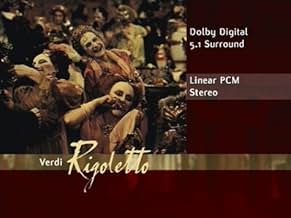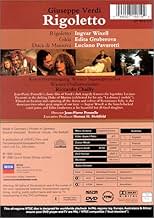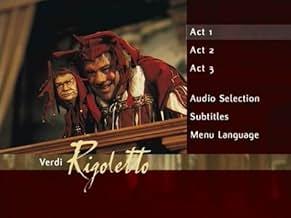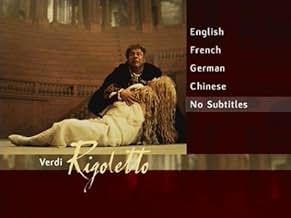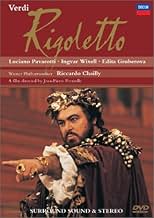Füge eine Handlung in deiner Sprache hinzuThe Duke lives the high life. The court jester taunts too well. Revenge has unintended consequences both times it is attempted.The Duke lives the high life. The court jester taunts too well. Revenge has unintended consequences both times it is attempted.The Duke lives the high life. The court jester taunts too well. Revenge has unintended consequences both times it is attempted.
- Regie
- Drehbuch
- Hauptbesetzung
Empfohlene Bewertungen
Jean-Pierre Ponnelle made many opera films between 1974 and 1988. This was at a time when it was unusual and technically quite difficult to record live performances of operas on stage. Ponnelle tended to make operas look like Hollywood musicals. They have high production values and are visually attractive. The performers are world-class but the singing is dubbed and the films have an artificial look about them. I am aware of the irony of complaining that Ponnelle's opera productions look artificial: what could be more artificial than people singing a story on a stage? But we accept opera within its own conventions. If the singers are not singing it looks phoney. If the performers are not doing it for real you can tell because they are not putting enough effort into it. It's a bit like soft core pornography I suppose.
This production from 1982 stars Luciano Pavarotti, who was then probably at the peak of his powers. He sounds wonderful but he has never been noted for his acting ability. He can put over an aria if he is really singing but when he is miming he has a frightened look in his eyes. Furthermore, it looks as if Pavarotti was rarely in the studio at the same time as the rest of the cast. I think only in his duet with Gilda does he appear in the frame simultaneously with another performer. It looks as though he recorded his part separately. For all I know he was probably in a different continent when the rest of the cast were making the film.
Edita Gruberova is a shrill Gilda. Ingvar Wixell is a most unsympathetic Rigoletto. He also doubles the part of Monterone. This only serves to underline the artificiality of the enterprise. The only reason I bothered to review this film is that it is still doing the rounds on a British arts channel. I actually pay a subscription to see things like this. The following night, I watched a recording of the wonderful 2001 Covent Garden production of the same opera. It is reassuring to see how far the filming of opera has advanced in the last 20 years.
This production from 1982 stars Luciano Pavarotti, who was then probably at the peak of his powers. He sounds wonderful but he has never been noted for his acting ability. He can put over an aria if he is really singing but when he is miming he has a frightened look in his eyes. Furthermore, it looks as if Pavarotti was rarely in the studio at the same time as the rest of the cast. I think only in his duet with Gilda does he appear in the frame simultaneously with another performer. It looks as though he recorded his part separately. For all I know he was probably in a different continent when the rest of the cast were making the film.
Edita Gruberova is a shrill Gilda. Ingvar Wixell is a most unsympathetic Rigoletto. He also doubles the part of Monterone. This only serves to underline the artificiality of the enterprise. The only reason I bothered to review this film is that it is still doing the rounds on a British arts channel. I actually pay a subscription to see things like this. The following night, I watched a recording of the wonderful 2001 Covent Garden production of the same opera. It is reassuring to see how far the filming of opera has advanced in the last 20 years.
The magic of an opera is best experienced by being there, and filmed stage productions sometimes are involving enough that the viewer is able to get an emotional handle on the dramatic situations at the same time experiencing some of the great singing voices of our time; odd that this filmed, dubbed version is so distancing, that during the greatest tragic moment in the opera, the camera looks on from a great distance at a boat in a lake with some opulent city skyline in the background; the same happens in the stunning quartet; in a stage production the viewer can see and hear all four characters simultaneously, and get drawn up in the emotional maelstrom created by incipient murder--not in this version, as the camera cuts from one person to another and occasionally catches duos; that said there are excellent reasons to rent this Rigoletto: Underrated Ingvar Wixell is physically and vocally intense, a great and memorable performance of the lead, and the young Pavarottis voice has few rivals (although he distances himself from other singers); there are some fascinating visual concepts in Act I, and the entire opera is easy to follow--but there are better versions on DVD and the 2012 Met Version, set in Las Vegas, is a visual and aural knockout.
But this is not an Opera filmed on a theater. It is a movie. As such the scenes are not of a theatrical production and many are in exteriors. You will not see the Orchestra pit nor the Maestro.
This requires singers that are also good actors. Pavarotti, not always a good actor in the stage, comes out superb, but the best acting performance is Ingvar Wixell, as Rigoletto.
The female roles are very inferior. Edita Gruberova is totally visually inadequate for the role of Gilda, She looks like an old witch, and totally ruins all her scenes. Madallena is a bit more credible as a "putanna", with some feelings.
This requires singers that are also good actors. Pavarotti, not always a good actor in the stage, comes out superb, but the best acting performance is Ingvar Wixell, as Rigoletto.
The female roles are very inferior. Edita Gruberova is totally visually inadequate for the role of Gilda, She looks like an old witch, and totally ruins all her scenes. Madallena is a bit more credible as a "putanna", with some feelings.
I have been a huge fan of opera and classical music since a very early age. And I love Rigoletto, it has a fine story with wonderfully rendered characters. And of course, you can't talk of Rigoletto without mentioning Verdi's music, as is always the case with Verdi, it is outstanding. And this is not just "La Donna e mobile", Gilda's "Caro Nome" and the Quartet, the three best known bits.
I don't know about anybody else, but my personal favourite aria is Duke of Mantua's "Ella mi fu rapita...parmi veder Le lagrime", not just for the energetic start but then with the wonderfully lyrical and poignant second half of the aria, which for me shows that although the Duke is ruthless and a bit of a scoundrel he also has genuine feelings for Gilda. Another favourite is "Si vendetta, tremenda vendetta" which is so powerful when sung really well, the case here, like with Rigoletto's superb Cortigiani.
This 1982 film from Jean Pierre Ponelle is one of my favourite opera films ever, and I have seen a lot. The production values are exquisite, the camera shots are appropriately used, the location shots are breathtaking and we are also treated to lavish costumes and settings. And the singing and acting are top drawer, and helped hugely by the exemplary direction of Jean-Pierre Ponnelle.
Luciano Pavarotti is wonderful as the Duke, I have always been accustomed to his voice(one you recognise immediately upon hearing) which is so effortless at the top if not so much his acting, I can find him a kind of "stand-and-sing" sort of singer. Here though, Pavarotti does show some believable acting ability(see his playful eye contact in "Questo o quella" for instance) and is in great voice. He sings "La Donna e mobile" with real vigour and sings "ella mi fu rapita...parmi veder Le lagrime" beautifully, even if I do slightly prefer Placido Domingo's more poised and thoughtful recording of it under the baton of Sherrill Milnes(who along with Wixell is my personal favourite Rigoletto).
Pavarotti is supported solidly by some quite talented singers and actors. While occasionally a little on the sweet side as Gilda, Edita Gruberova does show a wondrous colouratura register and is suitably vulnerable and ethereal, and even better with the best acting of all the principles-being able to show so many dimensions to the character and wonderfully- is Ingvar Wixell as both Rigoletto and Monterone, which provided a very interesting parallel slant.
All in all, wonderful and I can say it is one of my personal favourites as of now. 10/10 Bethany Cox
I don't know about anybody else, but my personal favourite aria is Duke of Mantua's "Ella mi fu rapita...parmi veder Le lagrime", not just for the energetic start but then with the wonderfully lyrical and poignant second half of the aria, which for me shows that although the Duke is ruthless and a bit of a scoundrel he also has genuine feelings for Gilda. Another favourite is "Si vendetta, tremenda vendetta" which is so powerful when sung really well, the case here, like with Rigoletto's superb Cortigiani.
This 1982 film from Jean Pierre Ponelle is one of my favourite opera films ever, and I have seen a lot. The production values are exquisite, the camera shots are appropriately used, the location shots are breathtaking and we are also treated to lavish costumes and settings. And the singing and acting are top drawer, and helped hugely by the exemplary direction of Jean-Pierre Ponnelle.
Luciano Pavarotti is wonderful as the Duke, I have always been accustomed to his voice(one you recognise immediately upon hearing) which is so effortless at the top if not so much his acting, I can find him a kind of "stand-and-sing" sort of singer. Here though, Pavarotti does show some believable acting ability(see his playful eye contact in "Questo o quella" for instance) and is in great voice. He sings "La Donna e mobile" with real vigour and sings "ella mi fu rapita...parmi veder Le lagrime" beautifully, even if I do slightly prefer Placido Domingo's more poised and thoughtful recording of it under the baton of Sherrill Milnes(who along with Wixell is my personal favourite Rigoletto).
Pavarotti is supported solidly by some quite talented singers and actors. While occasionally a little on the sweet side as Gilda, Edita Gruberova does show a wondrous colouratura register and is suitably vulnerable and ethereal, and even better with the best acting of all the principles-being able to show so many dimensions to the character and wonderfully- is Ingvar Wixell as both Rigoletto and Monterone, which provided a very interesting parallel slant.
All in all, wonderful and I can say it is one of my personal favourites as of now. 10/10 Bethany Cox
The cast for this production of Rigoletto is excellent. Edita Gruberova sings Gilda magnificently and passionately. Luciano Pavarotti also sings splendidly. Vergara is a fine Maddalena; Fedora Barbieri is a famous older singer who sings the maid, Giovanna. Weikl sings Marullo; Wixell sings both Rigoletto and Monterone. As Rigoletto, Wixell is probably the most convincing acting singer in this hard-to-beat ensemble of great singers. Kathleen Kuhlmann in the Contessa. All principals are well-known and world-renowned.
This is an exciting Rigoletto visually as well as musically.
I have it on both laser disc and DVD. You should have it too!
This is an exciting Rigoletto visually as well as musically.
I have it on both laser disc and DVD. You should have it too!
Wusstest du schon
- VerbindungenVersion of Rigoletto (1908)
Top-Auswahl
Melde dich zum Bewerten an und greife auf die Watchlist für personalisierte Empfehlungen zu.
Details
- Laufzeit
- 2 Std. 8 Min.(128 min)
- Farbe
- Seitenverhältnis
- 1.37 : 1
Zu dieser Seite beitragen
Bearbeitung vorschlagen oder fehlenden Inhalt hinzufügen


